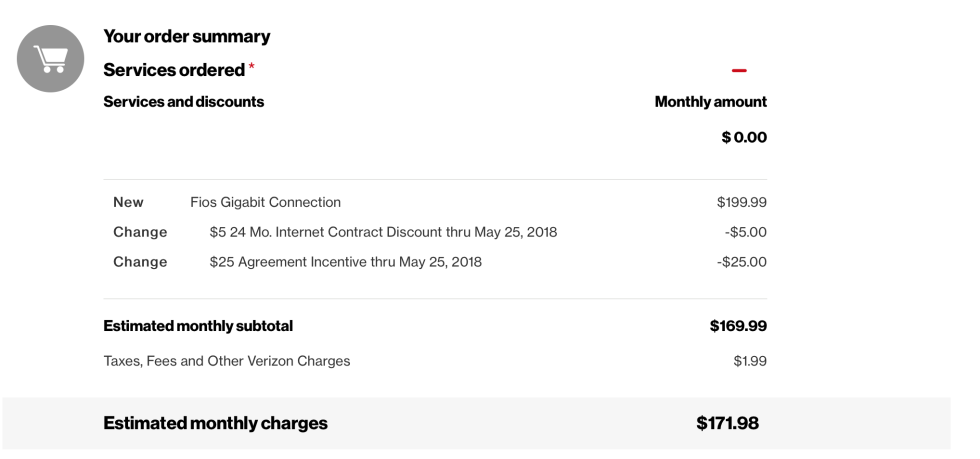
Verizon's rollout yesterday of a $70-per-month gigabit Internet plan was pretty confusing.
The Verizon announcement said the gigabit service would be immediately available to more than 8 million homes and did not say that the $70 price would only be available to certain customers. But it turned out that the $70 price was only for customers who don't have Verizon FiOS service today. Existing customers who tried to upgrade yesterday were told that the standard price was as much as $200 a month.
After exchanging many e-mails throughout the day yesterday with a Verizon spokesperson, we now have a better understanding of what went wrong and what should happen next. Verizon promised a "revolutionary speed and a revolutionary price." But there's more than one price.
The $70 price (plus router charges and other fees) is available for new customers, who can order the plan online now. Existing customers should be able to upgrade starting April 30, but they'll have to pay more than $70. Instead of providing a standard price to all existing customers, Verizon said it will charge different prices depending on what service plan and price each customer has today. Existing customers who already pay for 750Mbps, the previous top speed tier, should get the speed upgrade and a bill decrease to $80.
-
Verizon said the $70 price for new customers will be good indefinitely, but the ordering system says it depends on temporary discounts.
-
The ordering process indicates the discounts will expire after 24 months...
-
...while another part of the website says the $70 price is good for only one year.
-
Either way, you have to buy or rent a Verizon router.
-
Don't lie about whether you already own a Verizon router.
Ordering system not ready for existing customers yet
Despite the fact that Verizon immediately made the $70 gigabit plan available to new customers, it said the online ordering system for existing customers doesn't support upgrading to the new plans "because of updates we still need to make to the IT systems." Even the Verizon spokesperson we talked to wasn't aware of this fact until late yesterday afternoon, after many customers tried and failed to upgrade. Nothing in the Verizon announcement had indicated that existing customers should wait before trying to upgrade.
Existing customers who spoke to customer service reps yesterday should have been told about the delay until April 30 and advised to wait, Verizon told us.
But one customer who chatted with a Verizon rep online was given an estimated bill that showed a standard price of $200 for gigabit service. The estimate said that price would be lowered to about $170 through a "contract discount" and "agreement incentive" for the first 24 months. Confusingly, the 24 months seems to only last 13 months:

"It's 199.99/month for existing subscribers and she's saying that I can't sign up for new service for 90 days after cancelling to get the new price... way to go Verizon," this same customer wrote in a comment on our earlier story.
This customer also told us that he called Verizon and spoke to a rep who "indicated that something may be happening with new promotions at the end of the month and even offered to call me back on the first to see if anything comes up. She did look up the press release while on the phone but confirmed that the [$70] pricing was not available for her to select in her system."
What’s the real price? Depends on what you pay today
Another customer said he was told by a Verizon rep, "Your location qualifies for our FiOS Gigabit Connection (Up to 940/880 Mbps). The monthly cost for this plan is $189.99/mo." The Verizon rep then investigated further and found that existing customers couldn't order the speed upgrade just yet and that the customer should "come back online after [a] few days and we will be able to check the exact price."
There is no "exact price" that applies to all existing customers, it turns out.
"For existing customers, the specific price a customer pays to upgrade depends on what their current pricing is," a Verizon spokesperson told us. "A 150Mbps customer, for example, could upgrade to a gigabit connection for $20 more a month."
Standalone 150Mbps service usually costs $75 a month, so customers who upgrade to gigabit from this plan would pay $95 a month, Verizon said. But customers on other plans might see higher or lower prices if they try to upgrade to gigabit.
More confusion
There was also confusion on two other points. The new gigabit plan is an upgrade to an existing 750Mbps plan that starts at $150. Verizon's announcement yesterday said that customers who already pay for 750Mbps will get the speed upgrade and an automatic bill decrease. This seemed to indicate that these customers would get the $70 price, but at least one customer was subsequently told that this would not happen.
One customer who said he pays more than $200 for 750Mbps spoke to a Verizon customer support rep and was informed that he will get the gigabit speed but that the $70 price is for new customers only, the customer told us.
Although the customer service rep didn't seem to know anything about a bill decrease, Verizon eventually told us yesterday that existing 750Mbps customers will get their bills lowered to $80 a month, rather than the $70 price given to new customers. It took us a few hours to get that piece of information.
There was also confusion about the $70 deal for new customers. A Verizon spokesperson told us yesterday morning that there were "no plans" to raise the price above $70 and that it wasn't a promotional price that would automatically increase after a set period of time. But Verizon's online ordering system contradicted this.
We were able to get the $70 monthly price by plugging FiOS addresses into the online ordering system. But this price depends on promotional discounts: the system said that the "FiOS Gigabit Connection" standard price is $195, and it's lowered to $70 with the application of a $10 online ordering discount and a $115 "special bonus discount."
The ordering system shows a $70 monthly price for the first 24 months and says this is a "limited-time online offer for new Internet residential customers" and that the price will "increase after promo period." Normally, we'd assume that this means the special bonus discount and online ordering discount will both expire after two years, resulting in a price of $195 a month. Or maybe after just 12 months, because another part of the Verizon website said the $70 price is good only for the first year.
But when asked about this, the Verizon spokesperson said the company's website is wrong and reiterated that the company has no plans to increase the $70 price being given to new customers, even after the promotional period ends.
Either way, new customers will pay more than $70 a month. To sign up for the gigabit plan, you have to agree to pay $10 a month or $150 in a one-time fee for a Verizon FiOS router, or check a box saying that you already have the Verizon router. There are also "taxes, fees, and other Verizon charges" that seem to vary by location.
Bundles and speed limits
We've been talking only about standalone Internet plans in this article, but the gigabit service is also available to new subscribers in bundles with TV and phone service starting at $80 for the first year. The minimum price rises to $100 in the second year and $125 in the third year, with equipment costs included, according to an estimated bill we got from the Verizon website. For gigabit Internet and TV bundles without phone service, we got an estimated bill of $75 a month in the first year, rising to at least $90 in the second year. That estimate did not include equipment charges.
Verizon says it provides a "gigabit network connection to your home" but that "actual speeds vary due to device limits, network, and other factors." Average speeds quoted by Verizon are 750 to 940Mbps downstream and 750 to 880Mbps upstream.
Inconsistent pricing, and not much competition
Verizon's rollout of its gigabit pricing has been confusing, to say the least. The company could have avoided much of the confusion by making clear at the outset that the $70 price is available only for new customers, by immediately telling existing customers to wait until April 30 before trying to upgrade and by making sure that all customer service reps had up-to-date information. Instead, Verizon customers and journalists received contradictory information from the Verizon announcement, Verizon website, customer service reps, and media spokespeople.
Verizon could avoid confusion altogether by having a standard price for all customers—but then it wouldn't be able to extract more money from existing customers who have little choice of broadband providers and could have to pay early termination fees if they try to switch ISPs.
reader comments
131